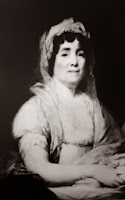 |
| Charles Wilson Peale, Portrait of Thomas Jefferson as Secretary of State, 1791, o/c (IMAGE: Wikimedia Commons) |
In 1802, Jefferson summed up his views on religious freedom:
"Believing that religion is a matter which lies solely between man and his God, that he owes account to none other for his faith or his worship, that the legislative powers of government reach actions only, and not opinions, I contemplate with sovereign reverence that act of the whole American people which declared that their Legislature should "make no law respecting an establishment of religion, or prohibiting the free exercise thereof," thus building a wall of separation between Church and State." --Thomas Jefferson to Danbury Baptists, 1802.
And, Jefferson was not alone---he had many fellow freedom-of-religionists in the period, including: James Madison, John Adams, George Washington, and, of course, the feminist author and philosopher Judith Sargent Stevens and her (eventual-) husband Reverend John Murray (they married in Salem in 1788, a second marriage for both). A minority in Gloucester, Massachusetts, and certainly in the nation, Universalists came under scrutiny for their rejection of predestination in favor of universal salvation. The also suffered legal prosecution for their abstention of payment of taxes to the local Protestant church, as at that time citizens paid their taxes via "pew taxes," and they did not believe in paying to support a faith they did not uphold. Undaunted, the little group persevered in its belief that they had an innate right to practice religion in their own way, without having to give in to the establishment Congregational church. In 1785, John Murray brought an appeal to the local County Court of Common Pleas' concerning their decision to fine him for performing what the local sheriff termed "illegal ministerial functions." Shortly afterward, John Murray signed on to a lawsuit to free his Universalist parishioners from having to pay taxes to the First Parish Church. Among his followers was Judith Sargent Stevens, his long-time friend and parishioner, who admired his preaching of Universalism and its embracing of the equality of women in the eyes of God. The Universalists were vindicated in 1786 when the Massachusetts Supreme Court ruled in their favor, setting a legal precedent for freedom of religion in this country. In response Judith wrote:
"The free born soul, conscious of its native rights, demands emancipation[.] Sweet equality is taking place in the mental world and every one resumes the prerogative with which nature hath invested him---to think for himself." (Skemp, 163)
Gilbert Stuart, Judith Sargent Murray, ca. 1815 (IMAGE: http://ghwalk.org/story-moments/34)
|
Eleven years after the Universalists' Massachusetts Supreme Court ruling, Joel Barlow, US Consul drafted the Treaty of Tripoli (1797-01-04):
"As the government of the United States is not, in any sense, founded on the Christian religion; as it has in itself no character of enmity against the laws, religion or tranquility of Musselmen [sic] … it is declared … that no pretext arising from religious opinion shall ever product an interruption of the harmony existing between the two countries. . . . The United States is not a Christian nation any more than it is a Jewish or a Mohammedan nation."So reads Article 11 of the Treaty, which was carried unanimously by the U.S. Senate and signed into law by John Adams, second President of the United States.
The proper relationship between church and state still remains in the news, but the Founders were clear, they rallied against exclusionary arguments. And, Judith and John Murray should be added to that important movement in the popular imagination.
By Kimberlee Cloutier-Blazzard, Development Associate
Skemp, Sheila L. First Lady of Letters: Judith Sargent Murray and the Struggle for Female Independence. Philadelphia: University of Pennsylvania Press, 2009.


